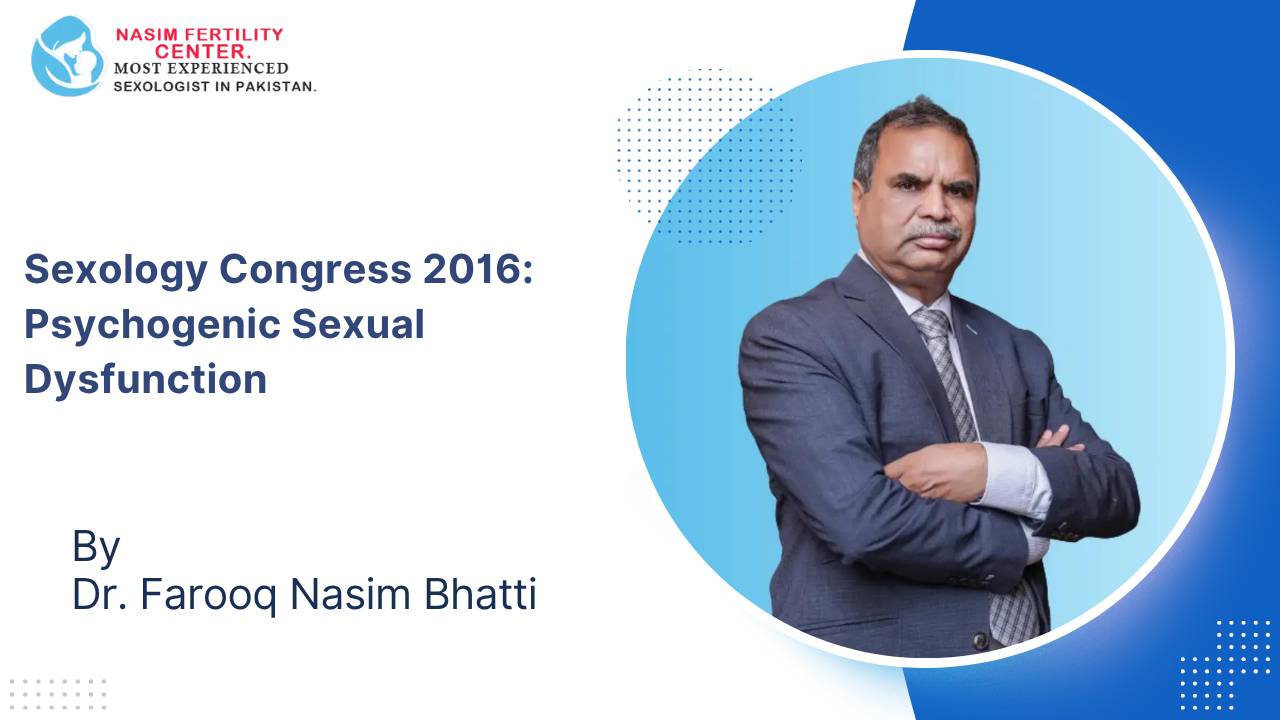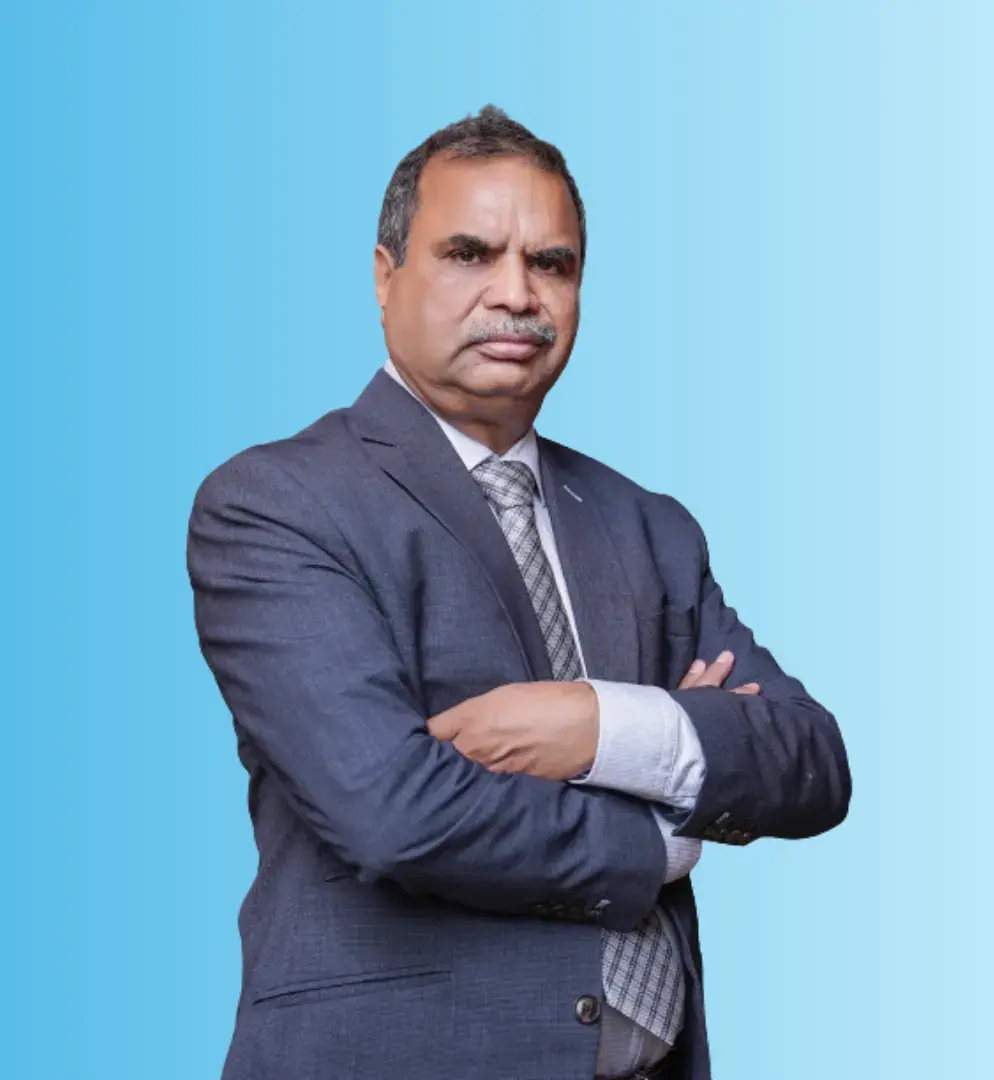
Based on the work and keynote presentation of Clinical Sexologist Dr. Farooq Nasim Bhatti at the 14th Congress of Asia–Oceania Federation of Sexology, Busan (2016)
Sexual health challenges such as difficulty achieving or maintaining erections (ED), premature ejaculation (PE), trouble reaching orgasm, or low sexual desire can occur even when medical tests appear normal. These symptoms often arise from a complex interaction between the mind and body. Anxiety, guilt, relationship stress, performance pressure, and negative sexual conditioning create a continuous loop in which fear and tension disrupt the natural sexual response.
Through decades of clinical experience in Lahore and Islamabad, Dr. Farooq Nasim Bhatti has demonstrated that when sexual dysfunction is primarily psychogenic—meaning driven by psychological and emotional factors—it can be effectively treated without depending on PDE5 inhibitors (such as erectile-dysfunction pills). His research and clinical results show that when the emotional, cognitive, and autonomic nervous-system components are addressed directly, normal sexual function can be restored in a majority of patients, within a structured 10–12 week treatment plan.
The key principle is clear: when the root issue is psychological, relying on erection medications can actually reinforce anxiety and lead to dependence. Over time, this reliance may reduce the person’s natural confidence and sexual responsiveness. Treating the underlying emotional and neurobiological imbalances provides a stronger, longer-lasting recovery.
Understanding Psychogenic Sexual Dysfunction, i.e., ED, PE, and Ejaculatory Diseases
Psychogenic sexual dysfunction refers to sexual difficulties that arise primarily from psychological, emotional, or relationship-based causes rather than physical disease.
- The condition can show up as difficulty in attaining or maintaining erections (ED), rapid ejaculation (PE), delayed orgasm, or diminished desire.
- Symptoms often worsen under pressure—for example, when a man feels he must “perform” or fears disappointing his partner.
- Even when minor physical factors exist, the psychological component often dominates.
- In Pakistan and many other conservative societies, limited sex education, taboos around sexual topics, and misconceptions about masturbation and semen loss often intensify guilt, fear, and anxiety.
- Young men may internalize harmful beliefs, such as thinking occasional erection difficulty means they are “not a man,” creating a cycle of self-doubt and stress that further blocks normal sexual function.
Why This Approach Avoids PDE5 Inhibitors
In cases where psychological factors are the primary cause, using erection pills may provide short-term confidence but ultimately undermines natural performance and recovery.
Dr. Farooq Nasim Bhatti observed two major issues with early or unnecessary PDE5 use in psychogenic cases:
- Men may develop psychological dependence and fear sexual activity without medication.
- Over time, the body may respond less effectively to medications, creating resistance if they are ever medically needed later.
For these patients, restoring natural sexual function without erection or time pills is both safer and more effective. Medication becomes a backup option, not the foundation.
The Three-Phase Treatment Program
Dr. Farooq Nasim Bhatti’s treatment model typically spans 10–12 weeks and combines structured sex therapy with selective psychotropic support when clinically necessary. Chemical formula and dose of medicines are given in written to the patients.
Phase One: Understanding & Stabilization (Weeks 1–2)
- Private, respectful, and stigma-free consultation.
- Goal: understand the individual’s sexual history, emotional patterns, beliefs, triggers, relationship dynamics, and any cultural or religious pressures.
- Basic medical evaluation occurs only when clinically indicated, as most patients present with normal health markers.
- Education: patients learn how anxiety and adrenaline interfere with sexual arousal, and how calm, safety, and trust restore normal function.
- Lifestyle adjustments: adequate sleep, moderate exercise, and relaxation techniques to support nervous-system balance.
Phase Two: Active Therapy & Nervous-System Regulation (Weeks 2–8)
This is the core of the program.
Sex Therapy has an 80–85% role in Psychogenic Sexual Dysfunction Treatment. Sex Therapy has four components:
- Explaining the nature of difficulty
- Enhancing communication between partners
- Advising certain home exercises
- Involving both partners in treatment
Sex therapy sessions focus on cognitive-behavioral strategies to:
- Challenge harmful thoughts
- Reduce fear around sexual performance
- Develop a healthier, calmer sexual mindset
Graduated intimacy exercises may be assigned to retrain the body to associate calmness—not pressure—with arousal.
Where clinically appropriate, short-term psychotropic support may be introduced to calm overactive fight-or-flight responses or reduce intrusive worry. This medication is not an erection pill—it is used strictly to normalize sexual response cycle in regaining healthy patterns.
Hormonal replacement is considered only when symptoms and labs suggest an imbalance.
Sex education tailored to the cultural context is essential:
- Myths about semen loss, masturbation-related weakness, or “lost manhood” are clarified with evidence-based guidance.
- Married patients are advised to engage in low-pressure, emotionally supportive intimacy.
- Unmarried individuals receive guidance to build confidence and resist harmful guilt-based narratives.
- Nutrition and physical activity are emphasized as natural regulators of mood and nerve health.
Phase Three: Consolidation & Confidence Building (Weeks 8–12)
- Focus shifts to maintaining progress and reducing relapse risk.
- Therapy exercises evolve to strengthen confidence and rebuild naturally enjoyable intimacy.
- If psychotropic support was used, this stage includes a medically supervised taper plan.
- Patients leave this phase with practical skills:
- Stress-management routines
- Communication tools
- Emotional grounding strategies
- Many patients notice significant recovery within approximately ten weeks; others continue periodic follow-ups to reinforce gains.
Who Benefits Most from This Method?
- Men suffering from Psychogenic Sexual Dysfunction (ED, PE, or ejaculatory diseases) whose symptoms fluctuate with stress or performance pressure
- Couples caught in cycles of fear and avoidance
- Younger men who struggle with cultural guilt or misinformation about sexuality
- Individuals who have already tried erectile medication without consistent benefit or complete recovery of natural sexual function, or who worry about depending on pills
Your First Visit: What to Expect
- Confidential and judgment-free conversation about symptoms, beliefs, and concerns
- Explanation of mind-body mechanisms involved in sexual response
- Personalized treatment plan
- Weekly or bi-weekly sessions with simple at-home practices
- Partner involvement welcomed when appropriate
- Review at 10–12 weeks to evaluate progress and plan continued support
The Outcomes We Aim For
- Restore natural sexual function:
- Steady erections
- Controlled ejaculation
- Satisfying orgasms
- Genuine intimacy
- Reduce anxiety and build confidence
- Gain lifelong skills rather than temporary fixes
Frequently Asked Questions
Is treating sexual dysfunction without erection pills safe?
Yes. When symptoms are primarily psychological, sex therapy combined with carefully selected psychotropic support is highly effective. Safety screening is always part of the process.
Will I need long-term medicine?
In most cases, no. If medication is used, it is short-term and gradually tapered.
Can anxiety alone cause sexual dysfunction?
Absolutely. Stress hormones like adrenaline can interrupt arousal, erection, and ejaculation pathways. Therapy reduces this biological stress response.
I already take ED pills. What now?
We treat the patient to restore his natural, normal sexual function, so that he doesn’t need to use ED pills.
Is masturbation harmful?
Masturbation is not harmful if done in the right way. Misunderstanding, guilt, or fear is what affects sexual health.
Private Consultation in Pakistan
- Locations: Islamabad, Lahore, Faisalabad
- Complete privacy and culturally-sensitive care
- Research-based path to restore natural sexual health
References
This research is supported by many other researchers and research papers/books, which are given below:
- Bhatti, F. N. (2016, November). Comprehensive treatment of male psychogenic sexual dysfunction by sex therapy and psychotropic drugs (without PDE5 inhibitors). [Keynote address]. 14th Congress of the Asia Oceania Federation of Sexology, Busan, Korea.
- Althof, S. E., Needle, R. B., & Levine, S. B. (2017). Psychotherapy for Erectile Dysfunction: Now More Relevant Than Ever. Journal of Sexual Medicine, 14(8), 1004-1006. https://www.jsm.jsexmed.org/article/S1743-6095(17)30889-8/fulltext
- Melnik, T., Soares, B. G., & Nasello, A. G. (2007). The effectiveness of psychological interventions for the treatment of erectile dysfunction: a systematic review and meta-analysis. Journal of Sexual Medicine, 4(6), 1497-1512. https://www.jsm.jsexmed.org/article/S1743-6095(15)31787-4/fulltext
- Rosen, R. C. (2001). Psychogenic erectile dysfunction: a critical approach. International Journal of Impotence Research, 13(Suppl 3), S43-S47. https://www.nature.com/articles/3900714
- Aubin, S., & Heiman, J. R. (2004). Cognitive-behavioral therapy for sexual dysfunctions. In Cognitive-Behavioral Therapies (pp. 346-369). American Psychological Association. https://psycnet.apa.org/record/2004-00163-014
- Waldinger, M. D. (2015). The neurobiological approach to premature ejaculation. Journal of Urology, 194(5), 1359-1366. https://www.auajournals.org/doi/10.1016/j.juro.2015.06.083
- Segraves, R. T. (2010). Pharmacotherapy for sexual dysfunction. Expert Opinion on Pharmacotherapy, 11(16), 2609-2621. https://www.tandfonline.com/doi/abs/10.1517/14656566.2010.492427
- Wylie, K., & Eardley, I. (2007). Sexual dysfunction and the aging male. Best Practice & Research Clinical Endocrinology & Metabolism, 21(3), 431-443. https://www.sciencedirect.com/science/article/abs/pii/S1521690X07000407
- McCabe, M. P., et al. (2016). Psychological and interpersonal dimensions of sexual function and dysfunction. Journal of Sexual Medicine, 13(4), 538-571. https://www.jsm.jsexmed.org/article/S1743-6095(15)30142-0/fulltext
- Jannini, E. A., & Lenzi, A. (2005). Epidemiology of premature ejaculation. Current Opinion in Urology, 15(6), 399-403. https://journals.lww.com/co-urology/abstract/2005/11000/epidemiology_of_premature_ejaculation.7.aspx
- Zilbergeld, B. (1999). The New Male Sexuality. Bantam Books. https://www.amazon.com/New-Male-Sexuality-Revised-Updated/dp/0553378721
Disclaimer
This information is for educational purposes and not the treatment. For treatment, you need to consult the doctor.

Dr. Farooq Nasim Bhatti (MBBS, FAACS – USA, Diplomate: American Board of Sexology, CST, HSC – Hong Kong, CART – Malaysia & China) is a qualified medical sexologist with 30+ years of experience. He has presented 21+ research papers internationally and treats sexual dysfunction through sex therapy, counseling, and pharmacotherapy to restore natural sexual function without temporary medication.

Regain Confidence with Our ED Solutions
Explore effective treatments for erectile dysfunction. Take charge of your intimacy today.


